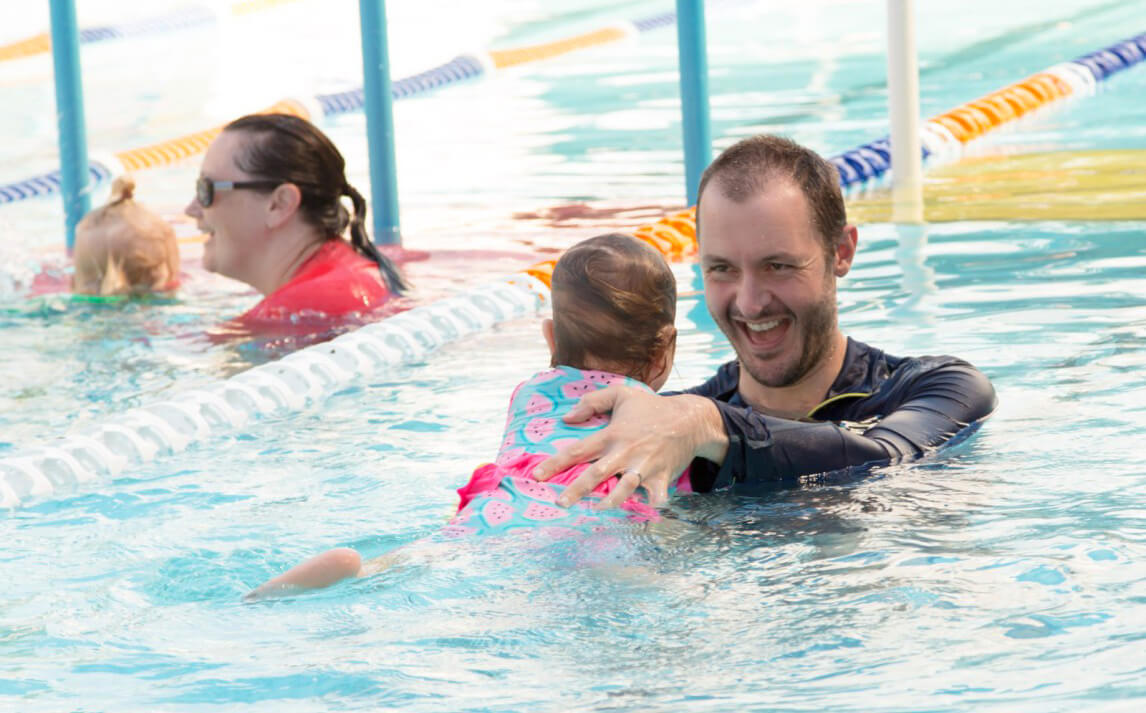Parental Influence in Baby/Toddler Swim Classes
Parents role in baby and Toddler swimming
Parents seeking ways to improve their young child’s confidence, independence and relaxation in water need look no further than their role as the caregiver ahead of and during a baby swimming lesson or new born swimming lesson.
The caregiver plays an invaluable role in assisting and enhancing the child’s aquatic development. Influences on a baby’s swimming ability are exerted well before a baby enters a swimming pool, and in fact these influences begin at birth with the bathing process.
Parents need to be aware of the verbal and physical influences they impart to their child about water
If the parent themself exhibits nervousness or fear around water, these emotions may in turn be passed on to the baby or young child, regardless of whether they have been verbalised.
Phrases such as “don’t go near the water, it’s dangerous!”, or actions including hastily dragging a child away from an aquatic environment such as the edge of a pool are likely to cultivate within a young child a negative attitude toward water, and in turn will magnify the difficulties associated with introducing the child to the water or swim lessons.
During initial swim lessons in particular, it is important for parents to be positive and to display their enthusiasm for the experience. Young children, and especially babies, are extremely in tune with their mum and dad’s reactions and responses, and an infant’s reaction to a new environment, sights, sounds and people will to a large extent be determined by the response of their carer.
For this reason, parents need to remain relaxed throughout the duration of a swim lesson. A parent’s body language is an important component of ensuring early swim lessons go smoothly, and is integral to the success of the water familiarisation and learn-to-swim processes.
A parent who is nervous and clings to their child or holds them out of the water sends a message to the child that the child is in an unsafe environment. Instead, the parent in the swim lesson should remain relaxed with your shoulders at the water’s surface or just below, and gently support the child in the water, or alternatively, if the child is old enough, they should encourage the independence of the baby in the water and allow the baby to hold onto them.
Parental involvement in the child’s lesson is fundamentally important.
The education provided by the instructor in correcting submersion techniques and providing guidelines for activities is paramount to a child’s progression, and allows the parent themselves to become a teacher outside of the structured lesson environment.
The full benefits of a swim lesson are acquired through active participation in lessons and listening to instructor’s guidelines for activities. An enthusiasm for all the swim lesson activities is essential….and in most cases requires the parent getting wet!
While most classes don’t require you to be able to swim, young children learn from what their parents do, so demonstration is a wonderful tool and hastens the learning process. When submerging or getting wet, parental communication with the child through facial expressions and tone of voice can provide the child with much-needed confidence.
Being positive about going under the water lets the child know that it is ok to submerge, and a parent’s resistance to such activities along with behaviours such as wiping eyes after surfacing should be avoided. Instructors will facilitate activities through the parents and, as such, positive reinforcement of the child through praise given at all stages is an important role of the parent.
Children love attention from their parents, and their confidence in the water will flourish naturally with praise
It is important to remember that every child learns at their own individual pace. Learning to swim is not a race in itself, so comparisons made with others in a class or efforts made to rush the learn-to-swim process often hinder the child’s swim development.
Furthermore, forcing a distressed or a crying child underwater is inappropriate, and can not only potentially harm a child’s swim progress, but also form the foundation of mistrust. The role of a parent in swim lessons for a child of the under 3 age group is much more than just getting in the water with the child. It involves the parent playing an active part in their child’s aquatic learning and education, as well as a respect for and an understanding of the water.
Contact Us today for baby swimming lessons in Brisbane Southside

